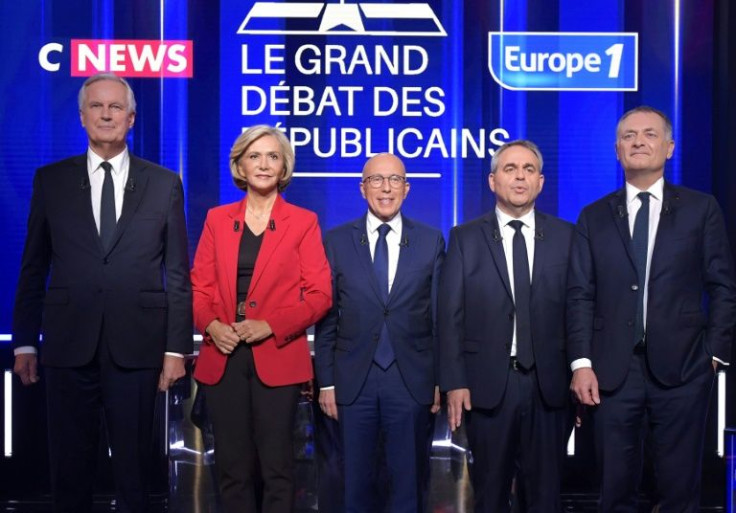French Right Contenders In Final Push Ahead Of Presidency Choice
Five contenders from France's conservative Republicans party crossed swords in a final debate on Tuesday ahead of party members choosing its candidate to take on President Emmanuel Macron in next year's elections.
For the Republicans, who have been wrangling over the choice since last spring, the declaration by far-right pundit Eric Zemmour earlier Tuesday that he will stand raised the stakes even further.
With no polling among the party members who will make the choice, the race remains wide open even in the last hours ahead of the party congress beginning Wednesday which will have a crucial impact on the shape of the April 2022 election.
With both Zemmour and veteran far-right leader Marine Le Pen in the contest, the Republicans will see how attractive their traditional platforms of security and pro-business policies remain with French voters.
Tuesday's prime-time debate on France 2 television was the last of four featuring the five contenders for the candidacy, before the two-round vote by party members this week with a winner announced on Saturday.
The candidates have tried to dismiss Zemmour's meteoric rise and his bid to woo right-wing voters, with polls showing him outpacing any Republican rival -- though still trailing both Macron and Le Pen.
"Eric Zemmour is not my kind of right-winger", said Xavier Bertrand, the boss of the northeastern Hauts-de-France region, who polls have predicted would be the strongest candidate if chosen.
"He does not have the stature to rally the French."
Valerie Pecresse, the head of the Ile-de-France region that includes Paris, also sought to rebuff Zemmour, saying she was a "woman of solutions" against a "man of provocations".

As a woman Pecresse stands out among the other Republican candidates, which includes Michel Barnier, the European Union's former Brexit negotiator, who is betting that party loyalty will endear him with activists.
Pecresse got a fresh boost Tuesday with an open letter in the Figaro newspaper signed by 1,300 local and national lawmakers, supporting "a woman and a project as modern as it is ambitious."
But Eric Ciotti, the law-and-order candidate who has called for a French "Guantanamo" prison for Islamist terror suspects, appears to have benefitted from growing interest in line with Zemmour's rise.
He was the only contender in the debate not to dismiss Zemmour's recently published election campaign video out of hand, saying it contained "ideas shared by many French".
Ciotti also provided the most eye-catching proposals of the night, saying he was in favour of a flat tax of 15 percent and also lengthening the presidential term to its former length of seven years from the current five.
Bertrand said he disagreed with the flat tax idea but suggested France should scrap its 35 working week rule.
The outsider is Philippe Juvin, a doctor and mayor of a Paris suburb who gained prominence during the Covid-19 crisis, who has pledged to put revitalised public services at the heart of his campaign. In the debate he said policymakers were like "sleepwalkers" in the pandemic.
A surge in party ranks to nearly 150,000 members in recent weeks adds a further element of uncertainty, since it remains unclear who the recent adherents will vote for.
Macron's centre-right platform has also siphoned away conservatives, though progressive social programmes such as allowing fertility treatments for lesbian couples and single women have alienated France's bloc of traditional Catholic voters.
© Copyright AFP {{Year}}. All rights reserved.





















